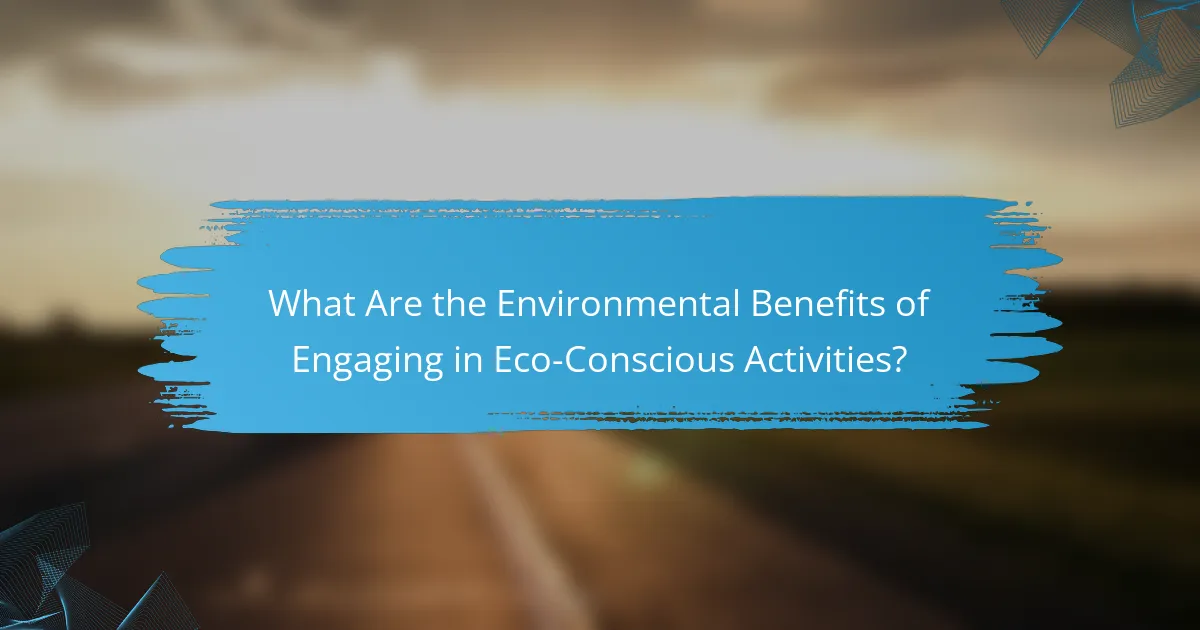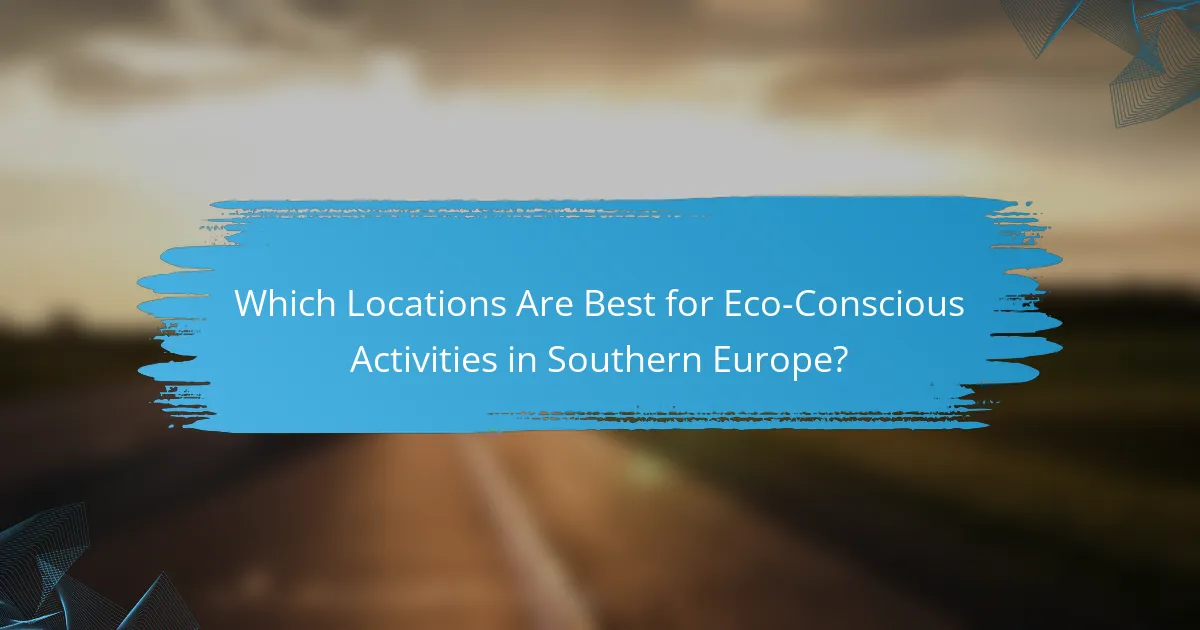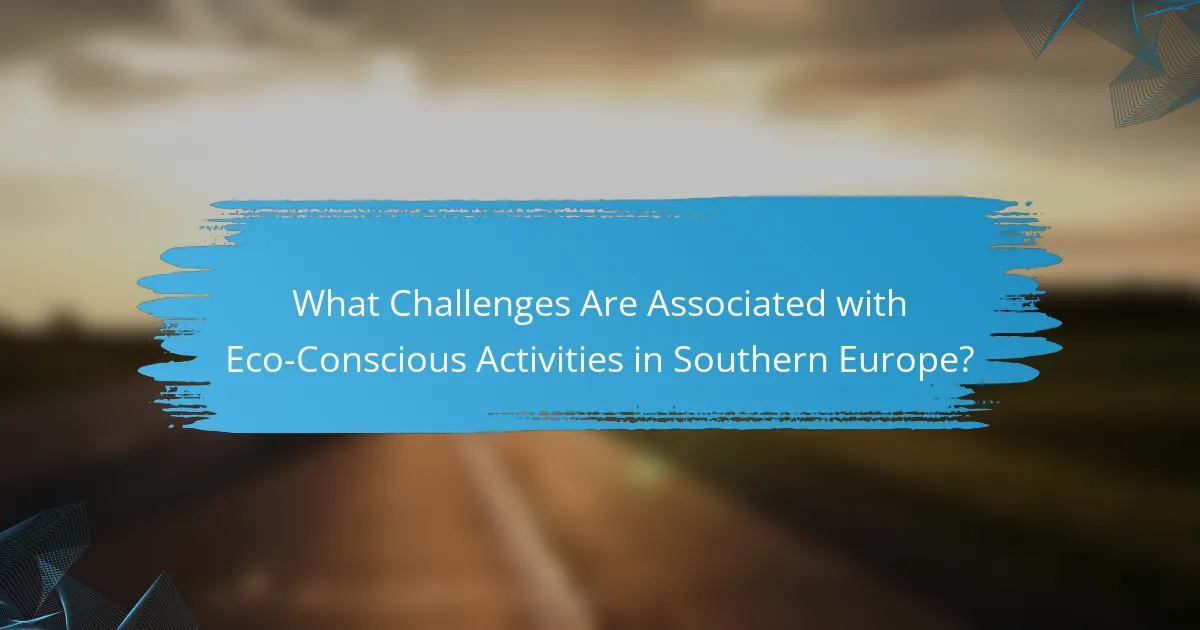Engaging in eco-conscious activities in Southern Europe offers significant benefits, including reduced carbon footprints and enhanced local economies. This article explores various experiences such as eco-tourism, organic farming, and wildlife conservation. It highlights key locations like the Costa Brava and the Amalfi Coast, emphasizing their unique contributions to sustainability. Additionally, it addresses challenges and future trends in promoting eco-friendly practices across the region.

What are Eco-Conscious Activities and Their Importance in Southern Europe?
Eco-conscious activities in Southern Europe promote sustainability and environmental awareness. These activities include eco-tourism, organic farming, and wildlife conservation. They foster community engagement and preserve natural resources. Locations such as the Costa Brava and the Amalfi Coast offer unique experiences. Benefits include reduced carbon footprints and enhanced local economies. Engaging in these activities supports biodiversity and cultural heritage.
How Do Eco-Conscious Activities Contribute to Sustainable Tourism?
Eco-conscious activities significantly enhance sustainable tourism by promoting environmental preservation and local culture. These activities, such as hiking, organic farming, and wildlife conservation, encourage travelers to engage with nature responsibly. They reduce carbon footprints and support local economies. For example, eco-tourism in Southern Europe often involves guided nature walks that educate participants about local ecosystems. As a result, tourists contribute to conservation efforts while enjoying authentic experiences. This symbiotic relationship fosters a deeper appreciation for the environment and encourages sustainable practices among visitors and locals alike.
What Role Do Local Communities Play in Promoting Eco-Conscious Activities?
Local communities play a vital role in promoting eco-conscious activities by fostering collaboration and awareness. They organize local events, such as clean-up drives and workshops, which encourage participation and education on sustainability. These initiatives create a sense of ownership and responsibility among residents. Additionally, communities often collaborate with local businesses to support eco-friendly practices, enhancing the overall impact. By sharing resources and knowledge, they strengthen the movement towards environmental stewardship in Southern Europe.

Which Eco-Conscious Activities Are Most Popular in Southern Europe?
Eco-conscious activities in Southern Europe include hiking, cycling, and sustainable tourism. These activities promote environmental awareness and support local economies. Popular locations for these experiences are the Mediterranean coast, national parks, and eco-villages. Engaging in these activities fosters a connection to nature and encourages conservation efforts.
What Unique Experiences Do Eco-Conscious Activities Offer in Spain?
Eco-conscious activities in Spain offer immersive experiences that promote sustainability and connection with nature. Participants can engage in activities like eco-tours, organic farming, and wildlife conservation, enhancing their appreciation for local ecosystems.
Unique experiences include exploring natural parks like Doñana and Sierra de Grazalema, where visitors can observe diverse wildlife and participate in conservation efforts. These activities not only foster environmental awareness but also support local economies by promoting responsible tourism.
Benefits include reduced carbon footprints and improved mental well-being through nature immersion. Additionally, these activities often provide educational insights into sustainable practices and biodiversity, enriching participants’ understanding of ecological balance.
Locations such as the Costa Brava and the Balearic Islands offer stunning backdrops for eco-conscious adventures, combining natural beauty with sustainable initiatives. This blend of enjoyment and responsibility makes eco-conscious activities a compelling choice for travelers in Spain.
How Do Eco-Conscious Activities in Italy Differ from Those in Portugal?
Eco-conscious activities in Italy focus on sustainable tourism practices, while Portugal emphasizes eco-friendly agriculture. Italy promotes initiatives like eco-tours in national parks, highlighting biodiversity. Portugal features organic farm stays and local food markets, enhancing community engagement. Both countries prioritize environmental preservation but differ in their experiential offerings.

What Are the Environmental Benefits of Engaging in Eco-Conscious Activities?
Engaging in eco-conscious activities in Southern Europe offers significant environmental benefits. These activities promote biodiversity, reduce carbon footprints, and enhance resource conservation.
Participating in local conservation efforts helps preserve unique ecosystems. For example, community clean-up initiatives in coastal areas protect marine life. Sustainable tourism practices support local economies while minimizing environmental impact.
Additionally, eco-friendly practices like organic farming improve soil health and reduce chemical usage. As a result, these efforts contribute to cleaner air and water, benefiting both the environment and public health.
Overall, eco-conscious activities foster a sustainable lifestyle, encouraging individuals and communities to prioritize environmental stewardship.
How Do Eco-Conscious Activities Help Preserve Local Biodiversity?
Eco-conscious activities significantly aid in preserving local biodiversity by promoting sustainable practices and habitat protection. These activities include community clean-ups, wildlife monitoring, and sustainable agriculture, which enhance ecosystem health. For example, engaging in organic farming reduces chemical runoff, benefiting local flora and fauna. Additionally, these initiatives foster community awareness and involvement, leading to more robust conservation efforts. As a result, areas in Southern Europe, such as the Mediterranean coast, see improved biodiversity and ecosystem resilience through these eco-conscious practices.
What Impact Do Eco-Conscious Activities Have on Carbon Footprint Reduction?
Eco-conscious activities significantly reduce carbon footprints by promoting sustainable practices. These activities include using public transport, engaging in local food sourcing, and participating in community clean-up events. For instance, using public transportation can lower individual carbon emissions by up to 45%. Additionally, local food sourcing reduces transportation emissions and supports regional economies. Engaging in eco-friendly practices fosters community awareness and encourages further environmental action.

Which Locations Are Best for Eco-Conscious Activities in Southern Europe?
Southern Europe offers numerous locations ideal for eco-conscious activities. Notable spots include the Costa Brava in Spain, known for sustainable hiking trails, and the Amalfi Coast in Italy, which promotes eco-friendly tourism. The Algarve region in Portugal features eco-tours focusing on marine conservation. Each destination provides unique experiences that enhance environmental awareness and promote responsible tourism.
What Are the Top Eco-Conscious Destinations in Spain?
Spain offers several eco-conscious destinations that prioritize sustainability and environmental preservation. Notable locations include the Canary Islands, known for their biodiversity and renewable energy initiatives, and Costa Brava, which promotes eco-tourism through nature reserves and organic farming.
Additionally, the Balearic Islands implement strict regulations to protect marine life and promote eco-friendly practices. The Andalusian countryside features eco-lodges and organic vineyards, enhancing the sustainable travel experience. These destinations provide opportunities for eco-friendly activities like hiking, cycling, and wildlife watching, all while supporting local conservation efforts.
Which Italian Regions Are Known for Their Eco-Conscious Initiatives?
Italy’s southern regions, particularly Sardinia, Apulia, and Campania, are recognized for their eco-conscious initiatives. These areas promote sustainable tourism, renewable energy projects, and organic agriculture. Sardinia’s commitment to preserving its natural landscapes through eco-friendly practices stands out. Apulia focuses on promoting local produce and reducing carbon footprints. Campania emphasizes waste management and recycling programs, enhancing environmental awareness among residents.
How Does Portugal Promote Eco-Conscious Activities Through Its Landscapes?
Portugal promotes eco-conscious activities through its diverse landscapes by integrating sustainability into tourism and local practices. The country’s natural parks, such as the Arrábida Natural Park, encourage activities like hiking and birdwatching, highlighting biodiversity. Coastal regions promote marine conservation through eco-tours and responsible fishing practices. Additionally, initiatives like reforestation and organic farming enhance environmental awareness and community engagement. These efforts not only protect natural resources but also foster a deeper connection between visitors and Portugal’s unique ecosystems.

What Challenges Are Associated with Eco-Conscious Activities in Southern Europe?
Eco-conscious activities in Southern Europe face several challenges, including limited funding, regulatory hurdles, and public awareness. These obstacles hinder the growth and adoption of sustainable practices. For example, local governments may lack resources to support eco-friendly initiatives. Additionally, varying regulations across regions can complicate implementation. Public awareness campaigns are essential to educate communities about the benefits of eco-conscious activities. These challenges can slow progress toward sustainability goals in the region.
How Can Travelers Overcome Barriers to Participating in Eco-Conscious Activities?
Travelers can overcome barriers to participating in eco-conscious activities by seeking local guidance, joining group tours, and utilizing online resources. These strategies enhance accessibility and provide support for sustainable practices. Engaging with communities fosters deeper connections and enriches experiences. Additionally, understanding local regulations and available eco-friendly options can facilitate participation.
What Are Common Misconceptions About Eco-Conscious Activities?
Many misconceptions exist about eco-conscious activities in Southern Europe. One common belief is that these activities are only for wealthy individuals, but they are accessible to all. Some people think eco-conscious efforts require significant time and effort, while many activities can be simple and quick. Additionally, there is a misconception that eco-friendly choices lack enjoyment; in reality, they often enhance experiences, such as exploring nature or participating in local community events. Lastly, some believe that eco-conscious activities are not effective, but collective efforts can lead to significant environmental benefits, contributing to sustainability and conservation.

What Are the Future Trends for Eco-Conscious Activities in Southern Europe?
Eco-conscious activities in Southern Europe are increasingly focused on sustainability, community engagement, and nature preservation. Future trends include eco-tourism growth, community-based conservation projects, and the rise of renewable energy initiatives.
1. Eco-tourism will expand, emphasizing local culture and environmental awareness.
2. Community-driven conservation projects will enhance local ecosystems and biodiversity.
3. Renewable energy initiatives will gain momentum, promoting solar and wind energy usage.
4. Sustainable agriculture practices will become more prevalent, supporting local economies.
5. Eco-friendly accommodations will increase, catering to environmentally conscious travelers.
6. Nature-based activities, like hiking and cycling, will attract eco-conscious tourists.
How Is Technology Influencing Eco-Conscious Activities?
Technology significantly enhances eco-conscious activities in Southern Europe by promoting sustainable practices and increasing awareness. Digital platforms facilitate eco-friendly tourism, enabling travelers to discover green accommodations and activities. Apps track carbon footprints, helping individuals make informed decisions. Renewable energy technologies are integrated into local businesses, reducing environmental impact. Smart agriculture solutions optimize resource use, supporting local food production. Overall, technology fosters a culture of sustainability, encouraging more people to engage in eco-conscious experiences across the region.
What Innovations Are Emerging in the Field of Eco-Conscious Tourism?
Innovations in eco-conscious tourism focus on sustainability and cultural preservation. New technologies enhance traveler experiences while minimizing environmental impact. For example, virtual reality tours allow users to explore destinations without physical travel, reducing carbon footprints. Additionally, local community involvement in tourism planning fosters authentic experiences and supports local economies. Emerging eco-lodges utilize renewable energy and sustainable materials, offering unique accommodations that align with eco-conscious values.
What Best Practices Should Travelers Follow to Maximize Their Eco-Conscious Experience?
Travelers should prioritize sustainable practices to enhance their eco-conscious experience in Southern Europe.
1. Choose eco-friendly accommodations that prioritize sustainability.
2. Use public transport or bicycles to reduce carbon footprints.
3. Participate in local conservation projects to support the environment.
4. Opt for plant-based meals to minimize resource consumption.
5. Respect local wildlife and habitats by following guidelines.
6. Reduce waste by using reusable items during travels.